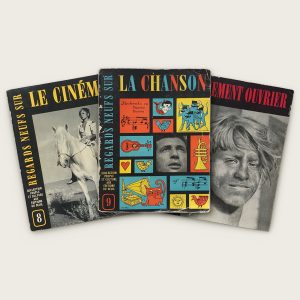Esprit [9 issues 1946-1950] [Chris Marker]
Directed by Emmanuel Mounier
€385,00
Paris: Esprit, 1946-1956. 8vo (23×14,5cm) each, printed wrappers. Page count per issue approx. 150pp. 9 issues. Text in French. General toning with minor soiling and occasional pencil marks. Several uncut sheets, but complete printing. Mild to moderate handling wear with chipping to spine-ends. [Janvier 1947 issue] repair tape at spine-tail, wrappers shaky but attached. [Octobre 1947 issue] two small dents on front cover, also affecting the title page, but no loss. [Mai 1947 issue] loss of spine tail, but binding intact, wrappers shaky, but attached. [Janvier 1956 issue] includes a bootleg of the missing original laid in pamphlet, Clair de Chine. Overall good to very good.
The Catholic left-wing journal Esprit was Chris Markers main outlet at the beginning of his career. Esprit was founded in 1932 by Emmanuel Mounier, the leading figure of French personalism. By adressing current problems of human coexistence, such as the relationship between economics and ethics or communism and Christianity, Esprit made an important contribution to the philosophy of personalism. Mounier’s editorial policy for Esprit concludes:
„Esprit caters to no single orthodoxy; a free journal, addressed to free men, it seeks the truth without claiming always and in all matters to be correct“.
Between 1946 and 1956, Chris Marker was a regular contributor for Esprit. In this time he wrote over seventy articles ranging from poetry, short stories, political and cultural essays, to book and film reviews. Whereby most of his writings where short texts in Esprit’s celebrated column Journal à plusieurs voix.
At that time Esprit‘s office was located in the same building as the publishing house Éditions du Seuil, in the heart of Saint-Germain-des-Prés, not far away from the headquarters of Peuple et Culture and Travail et Culture. They were all connected in one way or another to the Ecole des Cadres in Uriage, whose leaders believed that a highly trained and cultural professional elite would be needed for a cultural renewal and a political revolution after the end of the war. Interestingly, all of them were also connected to Chris Marker, or Chris Marker to them.
This collection, consisting of nine issues of Esprit journal, contains the following writings by Chris Marker:
Two short stories; Chris Marker’s often overlooked first text Les vivants et les morts (Esprit N°122, Mai 1946); Till the End of time, an apocalyptic short story that anticipated Marker’s most famous film La Jetée (Esprit N°129, Janvier 1947).
The political essay Le sommeil de l‘injuste on the Hardy affair, which involved René Hardy, a member of the French Résistance who was accused of betraying Résistance leader Jean Moulin, and other members to the Gestapo (Esprit N°133, Mai 1947).
Book reviews of Pierre Schaeffer’s Amérique, nous t’ignorons (Esprit N°126, Octobre 1946); Stefan Zweig‘s Castellion contre Calvin (Esprit N°133, Mai 1947).
The poem Les Séparés (Esprit N°162, Décembre 1949).
The very compelling piece Documentaire, a 59-page collection of documents presented by Chris Marker and Henri Michard on juvenile delinquents (Esprit N°169, Juillet 1950).
A variety of writings in Journal à plusieurs voix:
A propos de paradis terrestre, Une conférence de Louis Aragon (Esprit N°129, Janvier 1947); L‘apolitique du mois. – I. Moscou, 1er avril, L‘apolitique du mois. II, Un prologue qui est tout un programme, Newsreel (Esprit N°133, Mai 1947); Das tägliche Leben ohne Queffelek (Esprit N°137, Septembre 1947); Grognements indistincts (Esprit N°138, Octobre 1947); Cachez donc les Poètes (Esprit N°162, Décembre 1949).
This collection also includes the essay La Chine, porte ouverte, which appeared in Esprit N°234, Janvier 1956, with a Bootleg version of Chris Marker‘s pamphlet Clair de Chine. A short background information on this special issue:
A French delegation consisting of Chris Marker, playwright and journalist Armand Gatti, philosopher Paul Ricœur, and sociologist René Dumont had the rare oppertunity to visit China in 1955, organized by l’Association des Amitiés franco-chinoises.
During this trip in 1955, Marker made his film Dimanche à Pekin. Other experiences from this trip were published in the essay La Chine, porte ouverte, consisting of three articles: Certitudes et incertitudes d’une révolution by Paul Ricœur; Prose pour Pékin by Armand Gatti; and Réforme agraire et collectivisation accélérée by René Dumont, published in the Januar 1956 issue Esprit. For this issue, Chris Marker created a 12- page supplement pamphlet, titled Clair de Chine, presented as “a film in the guise of a greeting card” that takes an alternate approach to his visit to China. Clair de Chine, which was actually the original title of Dimanche à Pekin, includes photographs and texts by Marker that provide further perspectives on the film‘s themes.
![Esprit [9 issues 1946-1950] [Chris Marker]](https://chunkingbooks.com/wp-content/uploads/2021/06/esprit_1.jpg)
![Esprit [9 issues 1946-1950] [Chris Marker] - Image 2](https://chunkingbooks.com/wp-content/uploads/2021/06/esprit_01.jpg)
![Esprit [9 issues 1946-1950] [Chris Marker] - Image 3](https://chunkingbooks.com/wp-content/uploads/2021/06/esprit_2.jpg)
![Esprit [9 issues 1946-1950] [Chris Marker] - Image 4](https://chunkingbooks.com/wp-content/uploads/2021/06/esprit_3.jpg)
![Artsept: cahiers trimestriels de documentation cinématographique [complete set]](https://chunkingbooks.com/wp-content/uploads/2021/04/artsept_01-1-300x300.jpg)
![[Chris Marker] DOK 50 Heft 3: Sondernummer Film und Kultur. 3](https://chunkingbooks.com/wp-content/uploads/2021/03/dok_01-300x300.jpg)
![[Chris Marker] [Agnès Varda] Positif N°400: Le cinéma vu par les cinéastes [Juin 1994]](https://chunkingbooks.com/wp-content/uploads/2021/04/positif_01-300x300.jpg)
